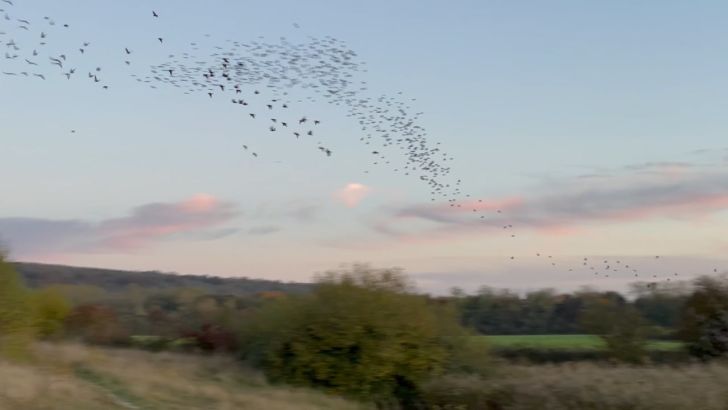Shapeshifters, the social life of starlings
We don’t have whale pods, wildebeest herds or a bloat of hippopotami, but we do have one of nature’s greatest seasonal spectacles: murmurations of starlings.
Starlings are those noisy birds with iridescent plumage that flock from garden to garden, looking for grubs and larvae in summer and berries and fruit in winter. Our local starlings tend to stay put, making space for winter migrants from the colder East who swell their numbers and turn these smaller flocks into serious autumnal and winter spectacles.
Shapeshifting offers safety and protection, like the millions of sardines seeking to evade being eaten because it’s difficult to single out a single creature from a swirling mass in the water and sky.
Just how do they do it?
The process begins before sunset as they gather on the rooftops, chatting away in the fading light. They take to the air in small groups, merging into one mass, breaking off into smaller groups that are re-absorbed, sweeping back and forth towards their communal roosting site. The sight is incredible, so is the roosting reedbed that seems like a Tardis: able to absorb countless birds as they all funnel downwards and disappear for the night. I am intrigued to know which bird signals that it’s time to dive, as apart from the swooshing of wings overhead, there is no bird song or calls.
It takes your breath away
I know you are rushing through your day, two minutes here, five minute there, but this week, please pause to watch the video. I have edited a three-minute shapeshifting spectacle into 54 seconds that are worth your time.
I linger to listen to the reeds, alive with chatter.
I feel so privileged to be able to watch these shapeshifters in a disused quarry near my home. They aren’t always there on demand, some evenings I don’t see them. I will keep the location to myself but will tell you it’s near College Lake, another disused chalk quarry repurposed as a bird and nature reserve.
They are a popular sight above Brighton Pier, the structure giving plenty of roosting.
Quick Links
The reclaimed worked-out chalk quarry, now an outstanding centre for wildlife at College Lake near Tring in Hertfordshire, giving the curious and nature-lovers access to an amazing range of wild plants and animals.


